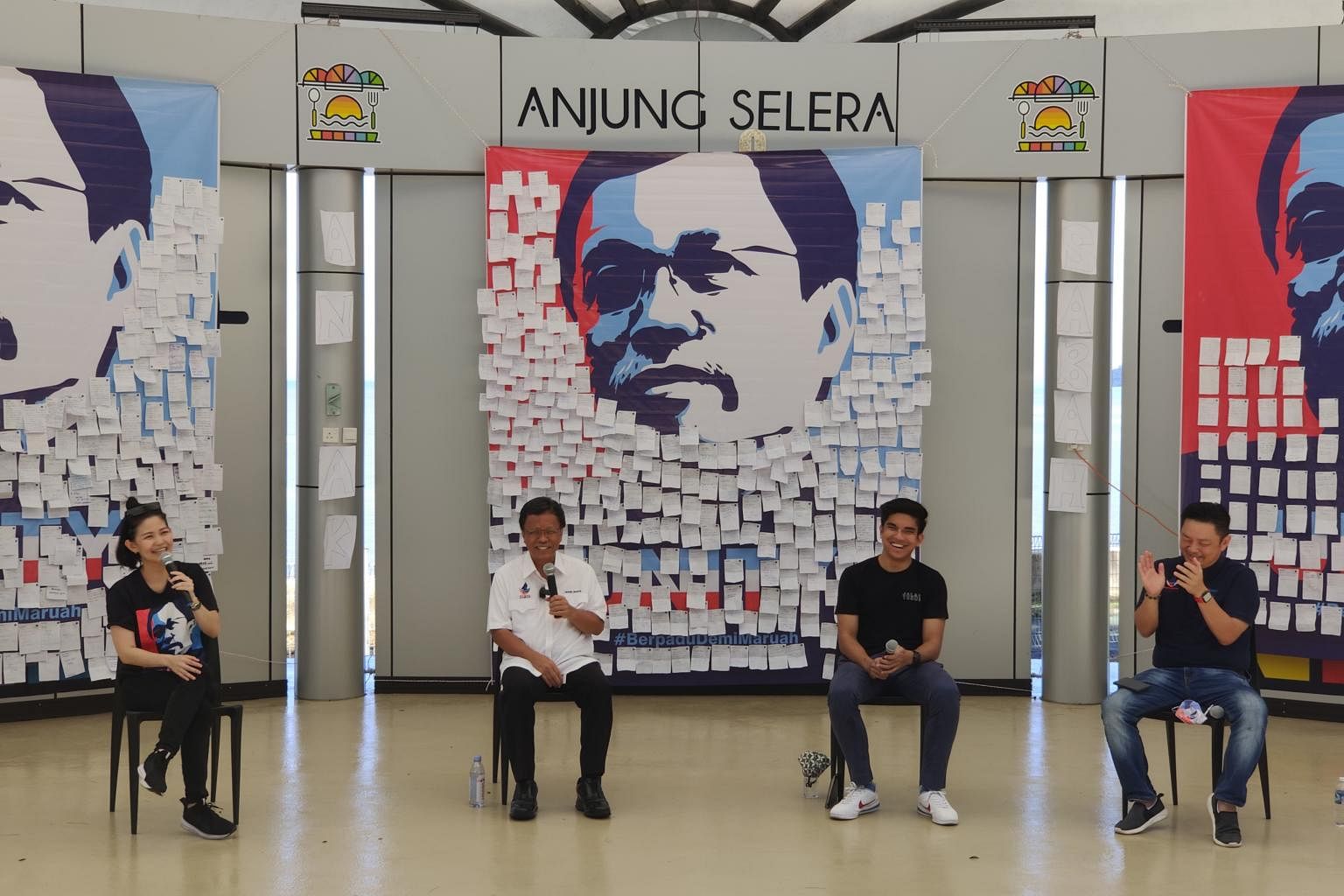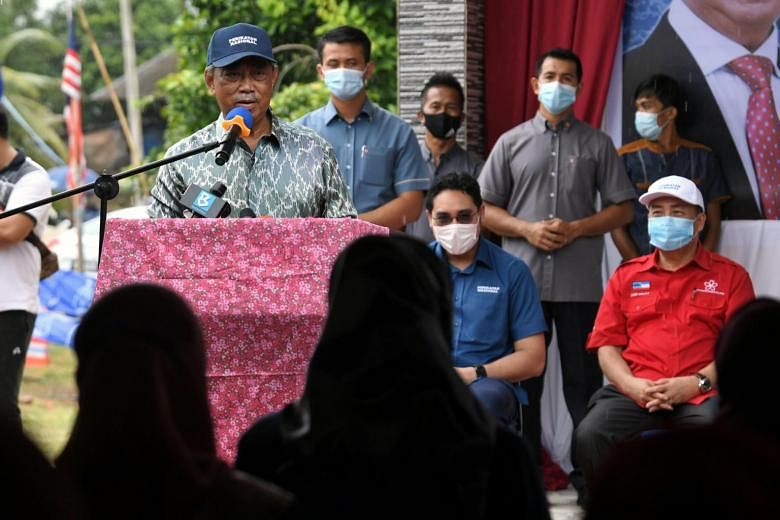KOTA KINABALU - Power plays within Malaysia Prime Minister Muhyiddin Yassin's coalition continue to encumber its bid in a crucial state election in Sabah on Saturday (Sept 26), which is taking place amid fresh questions over his majority in Parliament.
Tan Sri Muhyiddin's Gabungan Rakyat Sabah (GRS) - comprising Tan Sri Muhyiddin's Perikatan Nasional coalition (PN), Barisan Nasional and Parti Bersatu Sabah - has struggled to prevent electoral clashes among its own members.
This has effectively handed the advantage to the federal opposition-aligned Warisan Plus coalition led by caretaker Chief Minister Shafie Apdal, who has been touted as a possible prime ministerial candidate for the Malaysian opposition.
Mr Muhyiddin has hinted at the possibility of holding snap elections soon, should his GRS coalition win Sabah, where a staggering 447 candidates are vying for its 73 state assembly seats.
But Mr Muhyiddin's coalition partners, who banded together only on Sept 11, the day before nominations for this election took place, are contesting against one other in 17 of the seats - almost a quarter of the total.
There has also been uncertainty over who will be the coalition's chief minister should they win power.
Mr Muhyiddin had endorsed the Sabah chief of his own party, Parti Pribumi Bersatu Malaysia (Bersatu), Hajiji Noor, to be the state chief minister in the event of a victory. However, Umno president Ahmad Zahid Hamidi said that the decision on the appointment will be made after the elections.
Datuk Seri Zahid did not show up for a grand finale GRS rally in the outskirts of Kota Kinabalu on Thursday, the day after he cast doubts over Mr Muhyiddin's majority in Parliament when he said some Umno MPs are backing opposition leader Anwar Ibrahim to become the next prime minister. Umno is currently the biggest party in the PN government.
In contrast, the Warisan Plus coalition has successfully managed to avoid infighting, and incumbent Datuk Seri Shafie's face has been plastered all over the state in a clear indication of a single chief minister candidate should they win the polls.
Mr Shafie's campaign message is also finding traction. He has campaigned on the message of inclusivity - stressing on the multicultural and multi-religious aspect of life in Sabah, and preaching unity among races.
His message contrasts with polarised politics of Peninsular Malaysia, with the federal government being formed largely by parties based on race and religion. All Warisan Plus components - Warisan, United Progressive Kinabalu Organisation (Upko), Democratic Action Party (DAP), Parti Keadilan Rakyat (PKR) and Parti Amanah Negara (Amanah) - are multiracial parties.

"Shafie's unity message resonates well," said Singapore Institute for International Affairs senior fellow Oh Ei Sun, who is also a Sabah native. "Warisan does have the edge, as the other side (GRS) is disorganised and somewhat going at each other," he told The Straits Times.
While a Warisan victory is expected to embolden the federal opposition's attempts to retain power, it will also slow Umno's push for snap elections, the analyst said.
A GRS win also does not necessarily mean good news for Mr Muhyiddin, Dr Oh said, pointing out that it depends on the share of seats won by Mr Muhyiddin's party versus Umno.
"A GRS win with Umno vastly outnumbering Bersatu in seats would be a nightmare for Muhyiddin, as Umno would redouble efforts to push for elections," he said.
-
Key facts on the Sabah state election
Seats in the state assembly: 73
Registered voters: 1.12 million
Total candidates: 447
Parties contesting: 20
-
Demographics
Indigenous Bumiputera or native groups, such as the Kadazan Dusun Muruts and the Bajau people, form over half the population. Chinese and Malays make up 9 and 5 per cent of the population respectively, while foreigners form another 20 per cent. Islam is the biggest religion, with 65 per cent of the population being Muslims. There is a sizeable Christian community comprising 26 per cent of Sabahans.
-
Main alliances and seats contested
Gabungan Rakyat Sabah (GRS): Aligned to Perikatan Nasional, the ruling federal government
- Parti Pribumi Bersatu Malaysia: 19 seats
- Umno: 31 seats
- Malaysian Chinese Association: 4 seats
- Parti Bersatu Rakyat Sabah: 5 seats
- Parti Solidariti Tanah Airku: 8 seats
- Sabah Progressive Party: 2 seats
- Parti Bersatu Sabah: 22 seats
*GRS allies will contest against each other in 17 seats
Warisan Plus: Aligned to Pakatan Harapan, the federal opposition
- Parti Warisan Sabah: 46 seats
- United Progressive Kinabalu Organisation: 12 seats
- Democratic Action Party: 7 seats
- Parti Keadilan Rakyat: 7 seats
- Parti Amanah Negara: 1 seat
This election is the first time Mr Muyhiddin's party is contesting in Sabah. It stayed out of Sabah during the 2018 elections, when it was aligned with Warisan, and its Sabah chapter was formed after the elections. All of Bersatu's assemblymen in Sabah were elected on an Umno ticket.
Mr Shafie, on the other hand, has wasted no time in engaging with Sabahans of different age groups, and has managed to convince allies such as DAP and Amanah to contest the election under his party's logo - reinforcing the message of unity.
His campaign was largely smooth sailing until one of his candidates, Mr Mohamaddin Ketapi, a former federal minister, made remarks deemed to be insulting of security personnel regarding the 2013 Lahad Datu incursion. Sulu militants from southern Philippines had stormed the east coast of Sabah and engaged in a standoff with Malaysian forces after surrounding a village, during which six civilians and 10 Malaysian security personnel were killed.
Mr Shafie apologised for Mr Mohamaddin's remarks, but it is expected that some damage was already done, as the remarks were circulated just as army and security force personnel took part in early voting on Tuesday.
Mr Shafie has been touted as a PM candidate for the federal opposition, with the backing of two-time premier Tun Dr Mahathir Mohamad. While Datuk Seri Anwar claimed to have a parliamentary majority this week, Mr Shafie has not said if his party's nine MPs are also backing the PKR president for premiership.
Warisan has stayed out of officially joining any federal alliance, enabling it to continue being a Sabah-based party for Sabahans, free of direct influence from Peninsular.
Warisan's surprise win in 2018 elections and ability to form the state government changed the landscape of Borneo politics - leading to more parties in Sabah and Sarawak becoming more state-centric and detached from federal alliances.
The ruling parties of neighbouring Sarawak left Barisan Nasional following the 2018 elections, and formed their own alliance called Gabungan Parti Sarawak (GPS). GPS backs the current PN government but has not formally joined the coalition.
Sabah has over one million registered voters eligible to take part in this poll. The Communications Ministry is targeting a 70 per cent voter turnout for elections.


